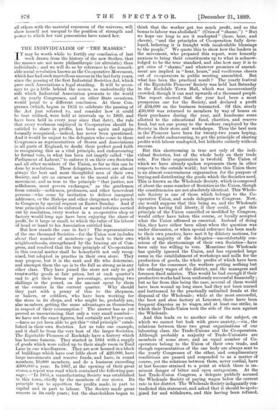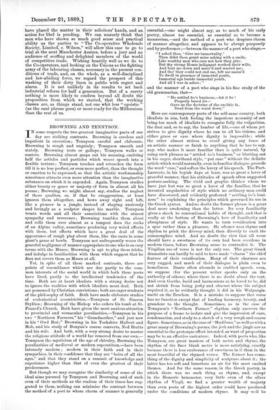THE INDIVIDUALISM OF "THE MASSES."
IT may be worth while to fortify our conclusion of last week drawn from the history of the new Strikes, that the masses are not more philanthropic (or altruistic) than individuals ; and we will do so by reference to the remark- able social revolution known as the Co-operative Movement, which has had such marvellous success in the last forty years, since the passing of the first Industrial Societies Act, which gave such Associations a legal standing. It will be neces- sary to go a little behind the scenes, as undoubtedly the side which Industrial Association presents to the world at its yearly Congresses, and on other State occasions, would point to a different conclusion. At these Con- gresses (which, begun in 1852 to celebrate the passing of the Act just referred to, and consider how it could be best utilised, were held at intervals up to 1869, and have been held in every year since that date), the rule that every workman employed in Co-operation should be entitled to share in profits, has been again and again formally recognised,—indeed, has never been questioned. And it would be unjust to the delegates who come to these Congresses as representatives of Stores and Associations in all parts of England, to doubt their perfect good faith in recognising this as a vital principle, and endeavouring by formal vote, in what has been not inaptly called "the Parliament of Labour," to enforce it on their own Societies and. all other members of the Union, so far as this can be done by resolutions. These delegates, however, are almost always the best and most thoughtful men of their own Society, and are as earnest as to the moral side of the movement, and as true to the principle "that justice, not selfishness, must govern exchanges," as the gentlemen from outside—noblemen, professors, and other benevolent persons—who come by invitation to deliver inaugural addresses, or the Bishops and other clergymen who preach to Congress by special request on Easter Sunday. And if true principles could be enforced or moral reforms carried out by resolution, every worker in a co-operative shop or factory would long ago have been enjoying the share of profit, be it large or small, to which the value of his labour of head or hand to his Association entitled him.
But how stands the case in fact ? The representatives of the one thousand Societies—for the Union now includes about that number of members—go back to their own neighbourhoods, strengthened by the bracing air of Con- gress, and resolved that the true principle of Co-operation in this crucial matter shall be henceforth not only recog- nised, but adopted in practice in their own store. They may propose, but it is the rank and file who determine, and amongst them the ego is to the full as strong as in any other class. They have joined the store not only to get trustworthy goods at fair prices, but at each quarter's end to get their bonus or per-centage, averaging two shillings in the pound, on the amount spent by them at the counter in the current quarter. Why should they part with a penny of this to the shopmen, or bakers, or cobblers, who have been working for the store in its shops, and who might be, probably are, also members, getting the same advantages as themselves in respect of their consumption ? The answer has as yet proved so unconvincing, that only a very small number— we have not the exact figures, but certainly not 10 per cent. —have as yet been able to get this "vital principle" estab- lished in their own Societies. Let us take one example, and it shall be from the very best of the larger Societies. The Equitable Pioneers of Rochdale have a history which has become famous. They started in 1844 with a supply of goods which were rolled up to their single room in Toad Lane in one wheelbarrow. They are now housed in a block of buildings which have cost little short of .220,000, have large investments and reserve funds, and have, in round numbers, 10,000 members, and do a business exceeding .2300,000 a year. In 1867, at the opening of their great stores, a report was read which contained the following pas- sage:—"In 1855, a manufacturing Society was established in this town, chiefly by the members of our stores. Its principle was to apportion the profits made, in part to capital and in part to labour. The Society made great success in its early years ; but the shareholders began to think that the worker got too much profit, and so the bonus to labour was abolished." (Cries of "shame.") "But we hope ere long to see it readopted" (hear, hear, and cheers), "and the principles of Co-operation fully deve- loped, believing it is fraught with incalculable blessings to the people." We quote this to show how the leaders in the movement, who prepared this report, were honestly anxious to bring their constituents up to what is acknow- ledged to be the true standard, and also how easy it is to get cries of "shame," and whatever promises of amend- ment are implied in "hear, hears," and vociferous cheers out of co-operators in public meeting assembled. But what has been the practical result ? The yearly festival of the Equitable Pioneers' Society was held last Saturday in the Rochdale Town Hall, which was inconveniently crowded, though it can seat upwards of a thousand people. The report showed that the year had been a most prosperous one for the Society, and declared a profit of .234,000 on the business transacted. Of this, nearly 0230,000 was returned to members by way of bonus on their purchases during the year, and handsome sums allotted to the educational fund, charities, and reserve fund, but not one penny to the workers employed by the Society in their store and workshops. Thus the best men in the Pioneers have been for twenty-two years hoping, and no doubt endeavouring, to get the principle of sharing profits with labour readopted, but hitherto entirely without success.
But this shortcoming is true not only of the indi- vidual Societies, but of the whole body on their trade side. For their organisation is twofold. The Union of which we have already spoken represents them in other respects to the outside world ; but within this Union there is an almost conterminous organisation for the purpose of buying and distributing the goods which the Societies need. This is known as the 'Wholesale Society, which is composed of about the same number of Societies as the Union, though the constituencies are not absolutely identical. This Whole- sale Society is one of those which belongs to the Co- operative Union, and sends delegates to Congress. Now, one would suppose that this being so, and the Wholesale delegates having full liberty, if they could, to get this principle of the Union cancelled or modified by Congress, would either have taken this course, or loyally accepted what the Union affirmed as essential. Instead of doing this, they have either been silent when the question was under discussion, or when special reference has been made to their own practice, have met it by dilatory motions, for which a majority of the delegates—uncomfortably con- scious of the shortcomings of their own Societies—have been only too willing to vote. Meantime the Wholesale has quietly ignored the Union, and has expended large sums in the establishment of workshops and mills for the production of goods, the whole profits of which have been taken for the consumer, the workers getting nothing but the ordinary wages of the district, and the managers and foremen fixed salaries. This would be bad enough if their productive works had been uniformly successful financially ; but so far from this being the case, several of them would have been wound up long since had they not been nursed and buttressed by the practically unlimited funds at the disposal of the Wholesale ; while at the most successful, the boot and shoe factory at Leicester, there have been frequent disputes as to wages, and at least one strike, in which their Trade-Union took the side of the men against the Wholesale.
And this leads us to another side of the subject, on which we cannot but look with grave anxiety,—viz., the relations between these two great organisations of our labouring class, the Trade-Unions and the Co-operators. Although probably a majority of Trade-Unionists are members of some store, and an equal number of Co- operators belong to the Union of their own trade, and though representatives of the one body are always sent to the yearly Congresses of the other, and complimentary resolutions are passed and responded to as a matter of course, yet the relations between them, never cordial, have at last become strained to a point at which there is im- minent danger of bitter and open antagonism. At the last Trade-Union Congress, a delegate publicly accused the Wholesale Society of paying wages below the current rate in his. district. The Wholesale Society indignantly con- tradicted this statement, and asked that it should be apolo- gised for and withdrawn, and this having been refused, have placed the matter in their solicitors' hands, and an action for libel is pending. We can scarcely think that men who have shown so much good sense and practical ability as the parties to "The Co-operative Wholesale Society, Limited, v. Wilson," will allow this case to go to trial at the next Manchester Assizes, before a jury and an audience of scoffing and delighted members of the world of competitive trade. Wishing heartily well as we do to the Co-operators, and looking on the -Unions as the fighting army of the labouring classes, necessary in the present con- ditions of trade, and, on the whole, as a well-disciplined and law-abiding force, we regard the prospect of this washing of their dirty linen in public with regret and alarm. It is not unlikely in its results to set back industrial reform for half a generation. But of a surety nothing is more likely to confirm beyond all doubt the proposition from which we started, that the working classes are, as things stand, not one whit less " egoistic " (as the cant phrase goes) or more ready for the Millennium than the rest of us.











































 Previous page
Previous page